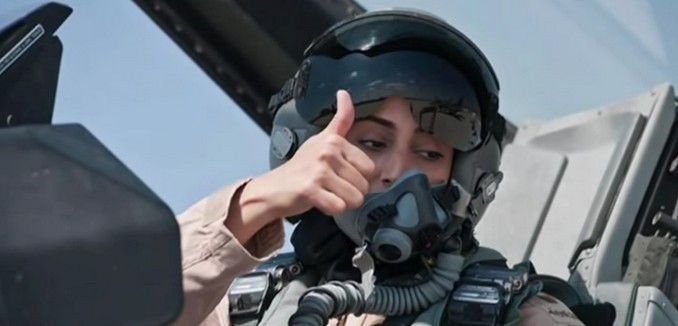Concern over their pilots’ safety and the growing role of Iran in the fight against the Islamic State of Iraq and Syria (ISIS) has prompted the United Arab Emirates to drop out of the American-led coalition fighting the terror group, The New York Times reported on Tuesday.
The United Arab Emirates are demanding that the Pentagon improve its search-and-rescue efforts, including the use of V-22 Osprey tilt-rotor aircraft, in northern Iraq, closer to the battleground, instead of basing the missions in Kuwait, administration officials said. The country’s pilots will not rejoin the fight until the Ospreys, which take off and land like helicopters but fly like planes, are put in place in northern Iraq.
The United Arab Emirates notified the United States Central Command that they were suspending flights, administration officials said, after First Lt. Moaz al-Kasasbeh of the Jordanian Air Force was captured when his plane went down near Raqqa, Syria. A senior American military official said Islamic State militants “grabbed” Lieutenant Kasasbeh “within just a few minutes.” He added, “There was no time for us to engage.” …
The exchange followed a month of disputes between American military officials and their counterparts in the United Arab Emirates, who have also expressed concern that the United States has allowed Iran to play a growing role in the fight against the Islamic State, also known as ISIS and ISIL.
The Times characterizes the disagreement between the UAE and the United States as “significant” because the UAE has been America’s “most stalwart Arab ally in the fight against” ISIS. The UAE has conducted more missions against ISIS “than any other member of the international coalition.”
In Confidence Game: Losing American Support, the Gulf States Scramble, which was published in the January 2014 issue of The Tower Magazine, Jonathan Spyer gave some background that explains the UAE’s concern with the growing Iranian role against ISIS.
Iranian policy in this regard is quite logical: It aims to bring the small Gulf countries under its control through a combination of threats and inducements. Diaku Hoseyni, an Iranian analyst, explained the rationale behind this in a recent article in the journal Esfahan-e Emruz. “Having lost hope that the United States will carry out a military strike on Iran,” he wrote, “smaller countries would prefer to control the danger posed by a powerful and dissatisfied country in their neighborhood, by expanding their friendly relations with Iran.” …
The core “anti-Iranian” alliance among Gulf countries consists of Saudi Arabia, Kuwait, the UAE, and Bahrain. There are now indications that the Iranians are engaged in a subtle attempt to draw some of these countries into its orbit. Media reports in recent days have revealed progress in talks between Iranian and UAE representatives over three Iranian-occupied islands in the Hormuz area—Abu Musa and the two Tunb islands. These islands are claimed by the UAE and, according to the latest reports, the deal would return them to UAE sovereignty, with Iran retaining “seabed” rights.
While the deal may not materialize, the very fact that the talks are taking place and Iran appears ready for compromise is telling. Iran is signaling to the small Gulf emirates that they can benefit from associating with Tehran. To achieve this, Iran is willing to be flexible on non-essential issues. The carrot is going hand-in-hand with the stick.
Though an agreement on the islands was reported to have been reached last year, Iran more recently insisted that it maintains “sovereign right to the three islands.”
In ISIS: Can the West Win Without a Ground Game?, which was published in the October 2014 issue of The Tower Magazine, Spyer wrote that a successful strategy of combating both ISIS and Iran would be to ally with those nations opposed to Islamic extremism, whether it is Sunni (ISIS) or Shiite (Iran).
Most obviously, there is a line of pro-American states along the southern side of the arena of the war. These are Israel, Jordan, and in a far more partial and problematic way, Saudi Arabia. Both Israel and Jordan have demonstrated that they are able to successfully contain the spread of the chaos coming out of the north. Both are well-organized states with powerful militaries and intelligence structures. Jordan has clearly benefitted from the deployment of U.S. special forces to prevent incursions by the I.S. Israel has also made clear that its resources will be available to assist the Jordanians should this be required. (Egypt, too, while not in the immediate vicinity of the conflict, can be a silent partner as well—as its campaign against the Muslim Brotherhood and tough line against Hamas have shown, it is nothing if not a virulent opponent to political Islam.)
In order to grasp the rationale for a policy of dual containment, the nature of the war between rival sectarian forces must be grasped. There is also a need for the clear understanding that the effort to preserve at all costs the territorial integrity of “Iraq” and “Syria” is mistaken. Rather, what should take place is support for those forces committed to order, as listed above, and non-support for the forces of political Islam.
In other words: If political Islam (rather than one specific jihadi group, to quickly be replaced by another) is the real problem, then the real solution is to ally, forcefully and over the long haul, with those forces most committed to stopping it: Israel, Jordan, the Saudis, and the Kurds.
Spyer’s argument for allying with Saudi Arabia applies to its neighbor, the United Arab Emirates.
[Photo: CBS This Morning / YouTube ]




